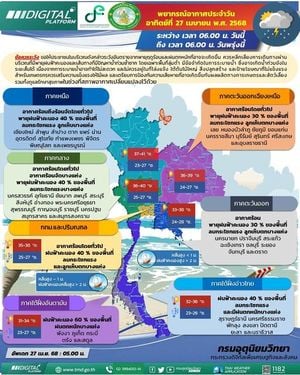On March 2, 2025, Chingu Amiga, the Korean influencer widely recognized for her relatable content bridging cultures between South Korea and Mexico, found herself embroiled in controversy after sharing the story of Erika, a Mexican woman recently deported from the United States. This situation has ignited discussions about the ethics of content creation when it involves vulnerable individuals, with critics accusing Amiga of exploiting Erika's plight for personal gain.
Chingu Amiga, whose real name is Sujin Kim, released a video where she detailed how Erika and her two children had been deported after spending five days without food or water. "Tuve oportunidad de poder ayudar a una persona que deportaron de EEUU… Estuvo 5 días sin comida, ni agua en una camioneta para llegar a México… quería compartir la historia para que conozcan más su situación…!" she stated, attempting to depict the harsh realities faced by deported families.
Despite her claims of good intentions, social media users swiftly criticized her. Many expressed concern about the ethics of using someone else's distress as content for views and profit. Critics pointed out the entitled nature of presenting Erika's family photo alongside her own smiling face, implying insensitivity to their suffering. Comments on social media included remarks like, "Exhibir las caras de las personas que ayudas solo es vulnerarlas...", highlighting the perceived exploitation of vulnerable demographics for influencer gain.
At the time of the article’s creation, Chingu Amiga's video had garnered over 967,000 views. While some defended her, applauding her effort to raise awareness, many alleged her main aim was to gain followers through sensationalism. She later remarked, "Recibí muchas críticas por el video que subí. No sabía que habría tanta crítica," acknowledging the backlash.
The controversy has deepened, as Chingu Amiga has faced scrutiny for previous allegations of promoting gentrification within Mexico and possibly evading tax obligations. Many users recall her past missteps when discussing her authenticity as a content creator. They argue questioning whether any benefits to helping others were overshadowed by her seeking personal gain. Comments like “Siempre diré que está aquí solo por nuestro oro” have surfaced, indicating mistrust among critics.
The conversation about influencer responsibility has escalated, with many asserting the importance of careful handling of sensitive content. Erika's narrative is not just statistics; it's the human aspect they argue should have come first. Social media responses have ranged from customers questioning the credibility of Chingu Amiga’s endeavor to accusations insinuated about her motives, prompting prolonged discussions about sincerity and authenticity online.
Chingu Amiga has reiterated her fondness for Mexico, again stating how she feels free to express her identity and connect deeply with the local culture. Her charisma captures audiences, yet recent events have placed her on the other side of scrutiny. Followers are now divided between those who think she is simply misunderstood and those who regard her business approach as opportunistic.
While surfacing serious issues related to undocumented deportation cases, the influencer’s actions spotlight the very thin line between helping and exploiting human tragedy for content. Her narrative emphasizes both the responsibilities of content creators when handling vulnerable populations and the fine balance of audience expectations.”
Overall, the incident involving Chingu Amiga serves as a stark reminder of the necessity for influencers to navigate their platforms with awareness and intention. It serves to underline the discussions around ethical responsibility within the digital content creation sphere, where algorithms can often prioritize virality over humanity.



